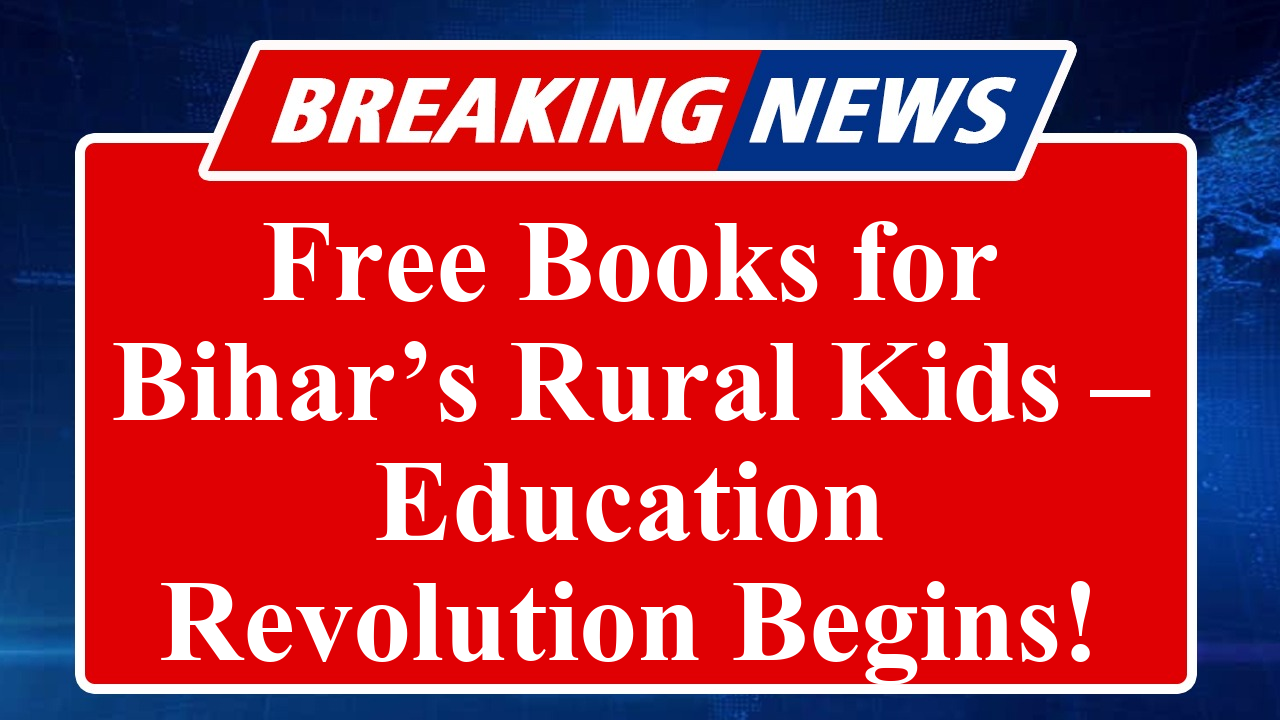“On June 30, 2025, Bihar’s government launched a transformative education drive, distributing free textbooks to rural students across the state. Aimed at bridging the urban-rural education gap, the initiative targets over 10 lakh students in government schools, ensuring access to quality learning materials. The program, backed by ₹500 crore, also includes digital resources via the e-LOTS platform to enhance educational equity.”
Bihar’s Education Initiative: Free Textbooks Transform Rural Learning
On June 30, 2025, the Bihar Education Department rolled out an ambitious initiative to provide free textbooks to over 10 lakh rural students across government schools in the state. Launched under the aegis of the Bihar School Examination Board (BSEB) and the State Council of Educational Research and Training (SCERT), the program aims to address educational disparities by ensuring that students in remote areas have access to essential learning materials. The initiative, funded with a ₹500 crore allocation from the state’s 2025-26 education budget, marks a significant step toward achieving 100% literacy in Bihar, a state that has historically grappled with low literacy rates in rural regions.
The free textbook distribution targets students from Class 1 to Class 12, covering subjects aligned with the latest BSEB syllabus. Textbooks, published by the Bihar State Text Book Publishing Corporation (BSTBPC), are being distributed through a network of over 70,000 government schools. In addition to physical books, the initiative integrates digital resources through the e-LOTS (e-Library of Teachers and Students) platform, allowing students to access e-textbooks and supplementary materials on mobile devices or computers. This dual approach ensures that even students in areas with limited internet connectivity can benefit from printed materials, while those with access can leverage digital content for enhanced learning.
The program prioritizes rural areas, where access to quality education has often been hampered by economic constraints. According to the Economic Survey 2024-25, Bihar’s rural literacy rate stands at 68.5%, significantly lower than the urban rate of 82.3%. The initiative seeks to bridge this gap by removing the financial burden of purchasing textbooks, which can cost families up to ₹2,000 annually per student—an unaffordable sum for many rural households with an average income of ₹9,252, as per the National Bank for Agriculture and Rural Development’s 2021-22 data.
Chief Minister Nitish Kumar, speaking at the launch event in Patna, emphasized the transformative potential of the initiative. “Education is the cornerstone of Bihar’s development. By providing free textbooks and digital resources, we are empowering our rural youth to dream big and compete on a national stage,” he said. The event, attended by education officials and local leaders, also highlighted the role of JEEViKA, Bihar’s rural livelihood promotion program, in mobilizing community support for the initiative.
The distribution process is being streamlined to ensure timely delivery. Block-level education officers have been tasked with overseeing logistics, with books reaching schools in 38 districts, including remote areas like Kaimur and Jamui. To address challenges such as transportation and storage, the government has partnered with local self-help groups to facilitate last-mile delivery. Additionally, the e-LOTS platform, launched in 2019, has been upgraded to include interactive content like animated lessons and practice modules, making learning more engaging for students.
The initiative also aligns with broader educational reforms in Bihar. The state has increased its education budget to ₹60,000 crore for 2025-26, the highest allocation in its history, signaling a strong commitment to improving educational infrastructure. This includes the expansion of ‘Didi ki Libraries,’ community libraries providing free books and internet access, which have already enrolled 1.1 lakh students, 63% of whom are girls, across 100 blocks since their inception in 2024.
Challenges remain, however. Teachers and parents in rural areas have raised concerns about the availability of trained educators to complement the free textbook initiative. In some schools, the student-teacher ratio exceeds 50:1, limiting the effectiveness of learning materials. The government has responded by announcing plans to recruit 10,000 additional teachers by the end of 2025 and conduct training programs to enhance pedagogical skills.
Students have welcomed the initiative, with many expressing relief at the reduced financial strain. Rani Kumari, a Class 10 student from Amhara village, said, “My family could barely afford books last year. Now, with free textbooks and access to e-LOTS, I can focus on preparing for my board exams.” The initiative’s emphasis on inclusivity also extends to special textbooks for aurally challenged students, released by SCERT on the same day, further demonstrating Bihar’s commitment to equitable education.
The program’s impact is expected to be far-reaching, with educationists predicting improved enrollment and retention rates in rural schools. By combining physical and digital resources, Bihar’s education drive is poised to empower a new generation of learners, fostering a more equitable and prosperous future for the state.
Disclaimer: This article is based on information sourced from government announcements, the Bihar School Examination Board (BSEB), the State Council of Educational Research and Training (SCERT), and reports from credible news outlets such as The Hindu and Bihar government portals. Data points, including budget allocations and literacy rates, are derived from the Economic Survey 2024-25 and other publicly available documents. While every effort has been made to ensure accuracy, readers are advised to verify details through official sources like biharboardonline.bihar.gov.in and scert.bihar.gov.in.

